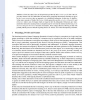Free Online Productivity Tools
i2Speak
i2Symbol
i2OCR
iTex2Img
iWeb2Print
iWeb2Shot
i2Type
iPdf2Split
iPdf2Merge
i2Bopomofo
i2Arabic
i2Style
i2Image
i2PDF
iLatex2Rtf
Sci2ools
101
click to vote
WOLLIC
2009
Springer
2009
Springer
Ludics and Its Applications to Natural Language Semantics
Abstract. Proofs in Ludics, have an interpretation provided by their counter-proofs, that is the objects they interact with. We shall follow the same idea by proposing that sentence meanings are given by the counter-meanings they are opposed to in a dialectical interaction. In this aim, we shall develop many concepts of Ludics like designs (which generalize proofs), cut-nets, orthogonality and behaviours (that is sets of designs which are equal to their bi-orthogonal). Behaviours give statements their interactive meaning. Such a conception may be viewed at the intersection between prooftheoretic and game-theoretical accounts of semantics, but it enlarges them by allowing to deal with possibly infinite processes instead of getting stuck to an atomic level when decomposing a formula. 1 Meanings, Proofs and Games The dominant trend in Natural Language Semantics is based on Frege’s conceptions on Logics and Language according to which the meaning of a sentence may be expressed in terms ...
Applied Computing | Natural Language Semantics | Sentence Meanings | Truth Conditions | WOLLIC 2009 |
Related Content
| Added | 25 May 2010 |
| Updated | 25 May 2010 |
| Type | Conference |
| Year | 2009 |
| Where | WOLLIC |
| Authors | Alain Lecomte, Myriam Quatrini |
Comments (0)

